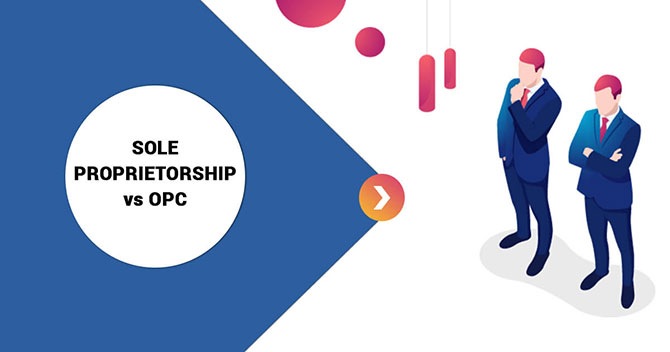
OPC or Sole Proprietorship

Here’s an overview of each:
OPC (One Person Company):
OPC is a legal business structure that allows a single individual to establish a company with limited liability.
It provides benefits such as separate legal identity and limited liability protection, meaning the personal assets of the owner are generally protected from the company’s liabilities.
OPC offers the advantage of a separate legal entity, providing a professional image and potentially facilitating business contracts and dealings.OPC allows a single person to own and manage the company while having the benefits of limited liability.
Sole Proprietorship:
Sole proprietorship is the simplest form of business ownership where an individual operates a business as an individual without forming a separate legal entity.It does not provide limited liability protection, meaning the owner’s personal assets are not separate from the business’s liabilities. The owner bears full personal responsibility for all business obligations and debts.
Sole proprietorship offers simplicity and ease of setup, with minimal legal formalities and lower compliance requirements. The owner holds absolute control and exercises full authority in making decisions for the business. The choice between OPC and sole proprietorship depends on several factors, including your business goals, liability concerns, scalability, and personal preferences.
Here are a few considerations:
If you prioritize limited liability protection and wish to establish a separate legal entity for your business, OPC may be a suitable choice. It provides the advantage of limited liability while allowing a single person to own and manage the company.
If simplicity, minimal compliance requirements, and full control over the business are more important to you, then a sole proprietorship might be a viable option. However, keep in mind that personal liability is a significant risk in sole proprietorship.
OPC or sole proprietorship recommended to consult with a legal or business professional who can assess your specific requirements, consider factors such as liability protection, scalability, tax implications, and compliance obligations, and provide guidance on the most suitable business structure for your circumstances.
FAQs:
Web Link: https://vibrantfinserv.com
FB Link: https://fb.me/vibrantfinserv
Insta Link: https://www.instagram.com/vibrantfinserv2/
Twitter: https://twitter.com/VibrantFinserv
LinkedIn: https://www.linkedin.com/in/vibrant-finserv-62566a259/

